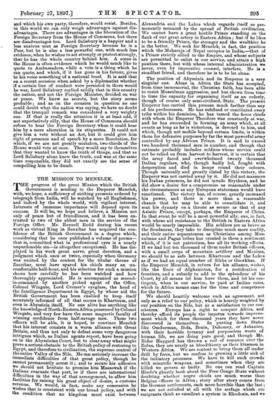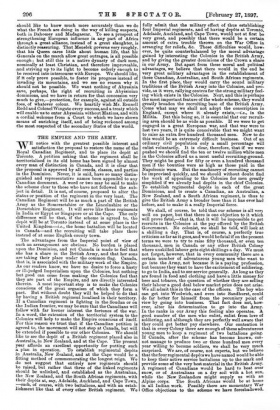THE MISSION TO MENELEK.
T"progress of the great Mission which the British Government is sending to the Emperor Menelek, with, we hope, a sufficiency of striking presents ordered by telegraph from India, will be watched by all Englishmen, and indeed by the whole world, with vigilant interest. Interests of immense importance will depend upon its success. It will be, we hope and believe, a Mission not only of peace but of friendliness, and it has been en- trusted to two of the ablest men in the service of the Foreign Office. Mr. Rennell Rodd during his recent work as virtual King in Zanzibar has acquired the con- fidence of the British Government in a, degree which, considering that he once published a, volume of poems— that is, committed what in professional eyes is a nearly unpardonable sin—is altogether exceptional. He has dis- played in his work great nerve, great devotion, and a judgment which once or twice, especially when Germany was excited by the contest for the titular throne of Zanzibar, must have spared his chiefs many an un- comfortable half-hour, and his selection for such a mission shows how carefully he has been watched and how thoroughly appreciated. He is accompanied as second- in-command by another picked agent of the Office, Colonel Wingate, Lord Cromer's eyeglass, the head of the Intelligence Department in Egypt, by whose aid the British Government has been enabled to keep itself accurately informed of all that occurs in Khartoum, and even in Abyssinia itself. No one alive has anything like the knowledge of North-Eastern Africa possessed by Colonel Wingate, and very few have the same magnetic faculty of winning confidence from half-savage men. These two officers will be able, it is hoped, to convince Menelek that his interest consists in a warm alliance with Great Britain, and thus not only to defeat some very dangerous intrigues which, as Italian agents report, have been going on in the Abyssinian Court, but to clear away what might prove a serious obstacle to the British policy of restoring to Egypt, and therefore to civilisation, the supreme control of the entire Valley of the Nile. He can seriously increase the immediate difficulties of that great policy, though he cannot permanently arrest it ; and to secure his adhesion we should not hesitate to promise him Massowah if the Italians evacuate that port, or if there are international difficulties in the way of that arrangement, to allow him facilities for raising his great object of desire, a customs revenue. We would, in fact, make any concession he wishes that is consistent with our broad policy, and with the condition that no kingdom must exist between Alexandria and the Lakes which regards itself as per- manently menaced by the spread of British civilisation. We cannot have a great hostile Prince standing on the flank of our great artery in Eastern Africa ; but if he likes to be a friendly Prince, the stronger and the wealthier he is the better. We seek for Menelek, in fact, the position which the Maharaja of Nepal occupies in India,—that of a Prince strictly allied to the Empire, and whose subjects are permitted to enlist in our service, and attain a high position there, but with whose internal administration we never, even by imperative counsel, interfere. He is a steadfast friend, and therefore he is to be let alone.
The position of Abyssinia and its Emperor is a very singular one. Alone in Africa the State has accepted, from time immemorial, the Christian faith, has been able to resist Mussulman aggression, and has shown from time to time the capacity for organising itself as an orderly, though of course only semi-civilised, State. The present Emperor has carried this process much farther than any of his predecessors. He has subdued or conciliated every tribe within his dominion, he has tamed the fierce chiefs with whom the Emperor Theodore was constantly at war, and he has succeeded in forming an army which, at all events as long as he is victorious, is devoted to him, and which, though not mobile beyond certain limits, is within them for defensive purposes by far the most powerful army controlled by any African Prince. It is said to exceed two hundred thousand men in number, and though that estimate probably includes soldiers whose service could not be relied on from harvest to harvest, it is certain that the army faced and overwhelmed twenty thousand Italian regulars, who, though badly led, fought with desperation and died in heaps round their colours. Though naturally and greatly elated by this victory, the Emperor was not carried away by it. He did not massacre his Italian prisoners, he did not invade Erythrea, and he did show a desire for a compromise as reasonable under the circumstances as any European statesman would have sanctioned. The victory has, of course, greatly increased his power, and there is more than a reasonable chance that he may be able to consolidate it, and seat his dynasty on a throne as secure as that of any Asiatic Prince, except, perhaps, the Emperor of China. In that event he will be a meet powerful ally, one, in fact, with whose aid resistance to the British in Eastern Africa would be nearly impossible. His soldiers are as brave as the Soudanese, they take to discipline much more readily, and their entire separateness as Christians among Mus- sulman and Pagan tribes has created in them a sentiment which, if it is not patriotism, has all its working effects. If we had but ten thousand of them under British officers, with a small corps of mountain artillery and Maxims, we should be as safe between Khartoum and the Lakes as if we had an equal number of Sikhs or Goorkhas. If the Emperor Menelek, in return for his alliance, wishes, like the Emir of Afghanistan, for a rectification of frontiers, and a subsidy to add to the splendour of his Court, by all means let him have them, and let his con- tingent, when in our service, be paid at Indian rates, which in Africa means ease for the time and competence for the future.
We should heartily welcome such an agreement, not only as a relief to our policy, which is heavily weighted by our position on the Nile, but as a satisfaction to our con- sciences. Europe has a right to conquer Africa, and thereby afford its people the impetus towards improve- ment which for three thousand years they have never discovered in themselves. In putting down States like Omdurman, Bida, Benin, Dahomey, or Ashantee, with their horrible tyranny and purposeless waste of human life, we are doing pure good, and though Mr. Rider Haggard has thrown a veil of romance over the Zulus, they are nearly as bloodthirsty as their kinsmen in Western Africa. We are content to bring them all under drill by force, but we confess to growing a little sick of the initiatory processes. We have to kill such crowds with scientific weapons, and sometimes when they are killed we govern so badly. No one can read Captain Hinde's ghastly book about the Free Congo State without doubting whether negro chiefs are much worse than Belgian officers in Africa ; story after story comes from the German settlements, each more horrible than the last ; we are not satisfied at all with the serfage which our emigrants think so excellent a system in Rhodesia, and we should like to know much more accurately than we do what the French are doing in the way of killing suspects, both in Dahomey and Madagascar. To see a prospect of -strengthening European influence in any part of Africa through a great alliance, instead of a great slaughter, is distinctly reassuring. That Menelek governs very roughly. that his Queen cares little about human life, that hie 'Generals on the march allow great outrages, is all possible enough ; but still this is a native dynasty of dark men, nominally at least Christian, and therefore improveable, and striving up to its light to become orderly enough to be received into intercourse with Europe. We should like, if it only prove possible, to foster its progress instead of invading its mountains, and we see no reason why it should not be possible. We want nothing of Abyssinia save, perhaps, the right of recruiting in Abyssinian dominions, and we have in return for that concession very much to give,—protection, for example, against all outside foes, of whatever colour. We heartily wish Mr. Rennell Rodd and Colonel Wingate every success, and a treaty which will enable us to enter Abyssinia, without Maxims, and with a cordial welcome from a Court to which we have shown means of enriching itself, and of being reckoned among the most respected of the secondary States of the world.



































 Previous page
Previous page